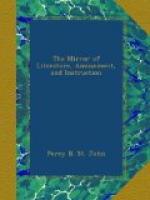“Prickey Sockey, for a pin,
I CAR not whether I LOSS or win.”
The game is played by the one holding between her two fore-fingers and thumbs a pin, which she clasps tightly to prevent her antagonist seeing either part of it, while her opponent guesses. The head of the pin is sockey, and the point prickey, and when the other guesses, she touches the end she guesses at, saying, "this for prickey,” or “this for sockey;” at night the other delivers her two pins. Thus the game is played and when the clock strikes twelve it is declared up, that is, no one can play after that time.
The Christmas dinner consists of large pork or goose pies, which Brand mentions as peculiar to this county; the goose is put in whole; they are all marked on the top by a fork with the owner’s initials; formerly it was a religious inscription. In the afternoon (be it spoken perhaps to their shame) they sally forth for a game at foot-ball, the first day on which the game is played, the ball is what they call clubbed up for, and he who can run away with the ball may keep it; but this seldom occurs, as it is kicked to pieces before the game is over. And this is Christmas Day here. At Kirby, a man named Tom Mattham (since deceased) used to go round the town on Christmas Eve, about twelve o’clock, with a bell, and chant a few carols; this was too solemn to be compared to the London waits, but the custom still exists.
In most of the western parts of Devonshire a superstitions custom prevails, that on Christmas Eve, at twelve o’clock, oxen in their stalls are always kneeling, as in the attitude of devotion; but since the style was altered, they do this on Old Christmas Eve only. At Whitbeck, in Cumberland, they have a similar superstition; the bees are said to sing on the midnight before Christmas Day, and the oxen to kneel at the same hour.
In many parts of the north too it should be observed, it is customary for men to go out and cut large ash and holly sticks and entwine them over the doors of their houses. And in Cumberland, little maidens assemble on Christmas to guess who their husband shall be, which is done by collecting peculiar sticks, and looking for some singular mark upon them. This is the time when sweethearts too send round their presents to the young lasses, by whom others are returned.
The custom of keeping open house is, I think, obsolete. Haddon Hall (so late as Queen Elizabeth) was kept open during twelve days after Christmas, with the old English hospitality. I observe also in some old books accounts of a feast of “cakes and ales” being usual.[9]
In the book of Christmasse Carolles, by Wynkyn de Worde in 1521, are the following verses on bringing in the Boar’s head:—
“A Carrol bryngyne in the boar’s
head,
Caput Apri defero.
Redden laudes Domino.




